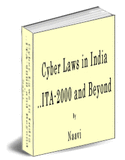.
There have been many instances in India about young Boys and Girls getting entangled in premature relationship as a result of the exposure to Internet. Some of these have resulted in young girls going missing ostensibly under the invitation of their Internet friends. Will they end up leading a happy life thereafter? ..or Will they be packed off for a price to a brothel in India or Abroad?..no body is certain.
This is one of the most common fears that prevents a conservative parent from encouraging their children from taking to Internet at an early age.
All sensible and responsible Netizens would like the benefits of Internet to reach their children at an early age but are unable to accept the present level of pornographic spam and uncontrolled chat options available on the Internet.
While controlling "Pornographic Content" on the web is one issue which has been dealt with in the past, it is necessary to draw the attention of the public to the abdication of community responsibilities by some large Internet players. Two such examples which come to our immediate mind are the India Times and Rediff web portals.
India Times Promoting Obscenity
One example I would like to state here is the India Times which hosts www.indiatimes.com as a Portal with several services. One such service is under "Clubs" where users can create their own clubs and post messages and files for other members to view. Some time back an angry parent from Bangalore pointed out that under the club entitled "Bangalore Sex Club", pornographic images are being displayed and he is concerned about its ill effects on his children. He was recommended to approach the Cyber Police Station at Bangalore.
I am aware that the Bangalore Cyber Police Station were recently following up an young engineering student of who had sent some e-mails to his girl friend which were perhaps not very decent and trying to book him under Section 67 of ITA-2000. The parents of the student were very much disturbed that their son's educational career was being threatened by the unusually hard stand taken by the Bangalore Police.
But Bangalore Police have not so far taken any action on the India Times Club section which by hosting a city specific pornographic joint is corrupting the minds of young residents and also spoiling the image of "Bangalore". In fact the current page of Bangalore Sex Club records more than 3600 members. The photos section of this club contains several objectionable photographs which indicate a direct violation of Section 67 by the club owners and also by the hosting site (Despite the Disclaimers).
Besides, it can be observed that India Times hosts 63 clubs with the caption "Sex' which are displayed under the key word search "Sex Clubs". Some of these clubs contain the names of other cities in India including Chennai. There is also a "Pune Bramhin Sex Club" to tease the community.
It is amusing to note that these pages carry the names of many prominent Indian Companies and Institutions at the mast head since the masthead is a rotating banner ad. The Ads under which nude photos are being displayed are in the names of institutions such as Sundaram Finance, Indian Oil, Mcmillan (India), Economic Times, Air India, Citi Bank, L G Electronics etc.
Despite the blatant pornographic material hosting, Police either in Bangalore (Where a Parent had perhaps complained) or in Mumbai (Where the Times of India is headquartered), have taken any action to stop this website service. Instead, Police are after the poor Cyber Cafe owners for giving access to such sites.
Rediff.com Promoting Flirting
Now we shall take the second example of Rediff.com. The home page captured here has an inviting advertisement of an SMS service which invites young persons to flirt and also gives training on what kinds of messages can be sent etc. This service is sponsored by many leading mobile service providers.
The question that arises in our minds is why the law enforcement authorities are not open to such blatant violation of norms of the society despite the ITA-2000 giving them powers to do so.
Simultaneously, it is time for Internet Advertisers to think if they should be seen as sponsors of such web pages.
While we can leave it to the Law Enforcement Agencies to decide if they need to stop this menace by going after such web site owners under Section 67 of ITA-2000 (read together with Section 79), it is time for the Internet Advertising Community or in its absence the Industry organizations such as CII to consider an Advertising Code which should not only control the content of ad messages as in the rediff SMS ad, but also the display of banner ads in pages where the content is not legal.
Naavi
August 2,2003
Send Your Views if any to Naavi
For Structured Online Courses in Cyber laws, Visit Cyber Law College.com
